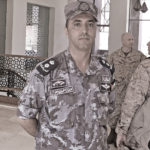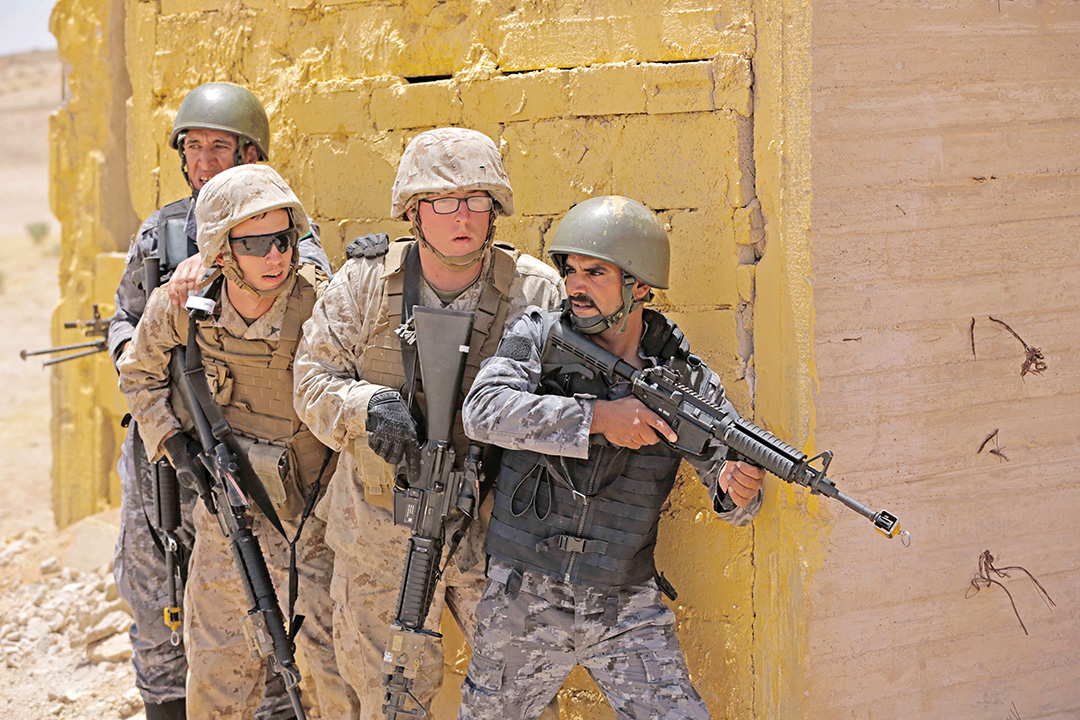Commanding Jordanian Marines
Granting authority to officers on the ground improves performance in unconventional operations
Unipath Staff
 Lt. Col. Hisham Khaleel Mubarak Al Jarrah, commanding officer of the 77th Royal Jordanian Marine Battalion, recently hosted the Regional Marine Symposium in Aqaba with U.S. and Middle Eastern counterparts. Much of the discussion concerned strengthening these compact, flexible forces for operations against terrorists. Lt. Col. Hisham sat down with Unipath to discuss enhancing the performance of his battalion by giving more command flexibility to noncommissioned and junior officers on the ground.
Lt. Col. Hisham Khaleel Mubarak Al Jarrah, commanding officer of the 77th Royal Jordanian Marine Battalion, recently hosted the Regional Marine Symposium in Aqaba with U.S. and Middle Eastern counterparts. Much of the discussion concerned strengthening these compact, flexible forces for operations against terrorists. Lt. Col. Hisham sat down with Unipath to discuss enhancing the performance of his battalion by giving more command flexibility to noncommissioned and junior officers on the ground.
Unipath: How did you come up with the idea to give noncommissioned officers in your unit wider authority?
Lt. Col. Hisham: Attacks around the world have shown that terrorist tactics are improving and that terrorists have increasingly entrenched themselves within cities. Armies, therefore, have started to adopt unconventional military tactics and to rely on lightly armed small groups of Soldiers that can maneuver and adapt quickly on the battlefield. Unconventional warfare demands high maneuverability and adaptability, and plans change unexpectedly. Therefore, noncommissioned officers and squad leaders must be trained to lead in battle at the platoon and squad level within their sectors and to have the authority to adapt plans to the variables of the battlefield. The idea began when I became convinced that the flow of work requires the involvement and presence of noncommissioned officers, who work every day with peers of similar ranks, and the lower rank privates. This began first by training a group of noncommissioned officers with the aim of increasing their expertise. They were then inserted into the work flow to get them used to taking responsibility and to increase their self-confidence. They were given some authority and were empowered to make decisions within their leadership positions. We are working hard to bring noncommissioned officers to a level that qualifies them and allows them to command a section or a squad on the battlefield confidently, efficiently and capably.
Unipath: In your capacity as commander of the 77th Royal Jordanian Marines, what importance do you place on training junior officers?
Lt. Col. Hisham: For a small unit to fulfill its role, all ranks need to participate in the task. This is true for any small-scale military unit. Junior officers and noncommissioned officers are the backbone and the core that allow the unit to carry out its tactical and administrative duties; consequently, they should also play a fundamental role in its management and training. Our work with our partners in the U.S. Marine Corps has taught us that focusing on training helps small units perform consistently and increases their fighting abilities, in addition to strengthening teamwork among unit members and increasing their cohesiveness and effectiveness under pressure.
Unipath: Tell us about the kind of training that junior officers and noncommissioned officers receive.
Lt. Col. Hisham: Our training is divided into three distinct types. First, there is basic training, in which individuals receive all the training they need to make the transition from civilian life to military life and to work in the ranks of the Armed Forces. After that, they receive specialized training that allows them to become Jordanian Marines. Further training is required for promotion, including technical training that allows a Marines noncommissioned officer to specialize in a particular field, such as being a section leader, fire leader, explosives expert, medic, machine gunner, warrant officer or squadron sergeant-major.

STAFF SGT. VITALIY RUSAVSKIY/U.S. MARINE CORPS
Unipath: Have you participated in joint training with U.S. forces?
Lt. Col. Hisham: The 77th Marine Battalion started training and conducting exercises with the U.S. Marine Corps in 2008, and these continue up to the present. They play an important role in developing our training and in raising the efficiency of the battalion Soldiers and officers through enriching their experience and developing their skills. It’s well-known that the U.S. Marine Corps has existed for more than 200 years, and this means it has extensive field experience. Our partnership with them has greatly improved the battalion’s performance and increased its ability to work jointly with other units, allowing it to better carry out its duties. Joint training with an advanced force like the U.S. Marines also improves Soldiers’ morale and qualifies them to carry out joint military actions, which has become imperative in fighting terrorist threats. The accomplishments of our counterparts in Iraq are an excellent example of what can be achieved by working with partners. They successfully fought a series of fierce battles against the gangs of Daesh. The effort was coordinated between the coalition forces and the Iraqi Armed Forces. This is why we need to ensure that we conduct joint trainings, because they get our Soldiers accustomed to working in a joint-action environment.
Unipath: In what way do you think focusing on training junior officers will develop the unit’s skills?
Lt. Col. Hisham: Naturally, junior officers welcome training and knowledge in all fields. A good officer is the one who continuously seeks to improve himself and to learn. However, the focus of their training should be on subjects that can enrich their knowledge and abilities in the field, help them to carry out their duties and enable them to make the right decisions in the field, in line with the level of their rank, responsibility and ability to manage their unit in the field.
Unipath: Does this program to train junior officers to lead small units exist across all of the Jordan Armed Forces?
Lt. Col. Hisham: Yes, it is present across the entire Armed Forces, taking into consideration the different structures and types of units. What differentiates us from other units is our continuous training with the U.S. Marines, which increases the experience of the battalion’s Soldiers in Marine tactics.
Unipath: The noncommissioned officers of the Royal Marine Battalion have experience in leading and managing the affairs of the unit. Do you think that building a cohesive force requires training and preparing professional noncommissioned officers?
Lt. Col. Hisham: Undoubtedly, a well-trained Soldier serves the unit better than one with little knowledge and training. Preparation and training are fundamental to building a cohesive unit and force that can carry out its responsibilities and missions as best as possible. The unit cannot succeed if it does not have exceptional and competent noncommissioned officers who enjoy the confidence of their subordinates and who can lead their sections and units. After all, they are closest to the Soldiers and act as a link between them and the officers. Moreover, the fact that noncommissioned officers train and fight alongside the Soldiers makes noncommissioned officers close to the Soldiers, so they know their skills and issues. This makes it easier to lead the unit and brings the Soldiers closer to their officers.
Unipath: What role do international partnerships play in supporting you in this program?
Lt. Col. Hisham: They improve our skills and knowledge. International forces help develop our abilities, training, and professionalism in our work. The U.S. Marines have shared their extensive tactical and counterterrorism expertise, as well as expertise in humanitarian operations. In addition to specialized field training and logistical support, we have gained practical, professional and administrative experience that has raised the level of our work. It is a successful experience with the U.S. Marines by all standards.


Comments are closed.